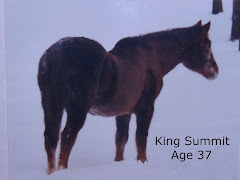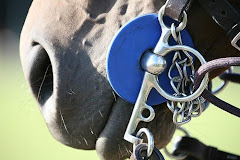
I know I had promised to write about "Horse Safety" this week, but an event occured this past week that made me change my mind. I suppose since this is my blog, I can write anything I want, so long as I keep it legal! Last Saturday was the first time since my accident in August, that I brought the horses in, from the back paddock. Its a bit of a walk, through the snow and ice, to get to the gate. When I got to the gate, I noticed that there was a layer of ice on top of the water tank. After I brought the horses inside for their dinner, I got my "trusty" hammer, and went to break-up the ice. To my horror, the water was solid ice!! The heater in the tank had died! I was sick-to-my-stomach thinking about the poor horses not having water. The only thing that calmed me down was knowing that they had water at night, while in their stalls. As a result of this incident I have decided to write about a couple of health issues that may occur in the winter. Colic: A horse consumes about 1 gallon of water for every 200 lbs of body weight. Ideally, the water temperature should be between 44 and 65 degrees. Without sufficient water a horse may develop a blockage in its' bowel, that could lead to colic. In the winter, when your horse is less active and water temperatures drop, there will be a decreased desire to drink. Use bucket/tank heaters (working, of course). Also, try to provide as much turn-out time as possible. Rain Rot, and other skin conditions. If you don't blanket your horse, and he is outside during cold, wet weather, be sure he has a chance to get dry. Rain Rot and Scratches(Mud Fever) are caused by bacteria. These organisms become trapped under a wet coat, or on the horses pasterns from standing in wet mud. Both conditions can be very painful, and are difficult to get rid-of. I blanket my horses, and they have outdoor shelters that have good drainage. I still remove the blankets on a regular basis to groom them, and check their skin/coats This also gives me a chance to make sure they are not losing weight, or as in Fancy's case, gaining weight. At least her butt will be wider than mine this Spring! I hope!!






No comments:
Post a Comment